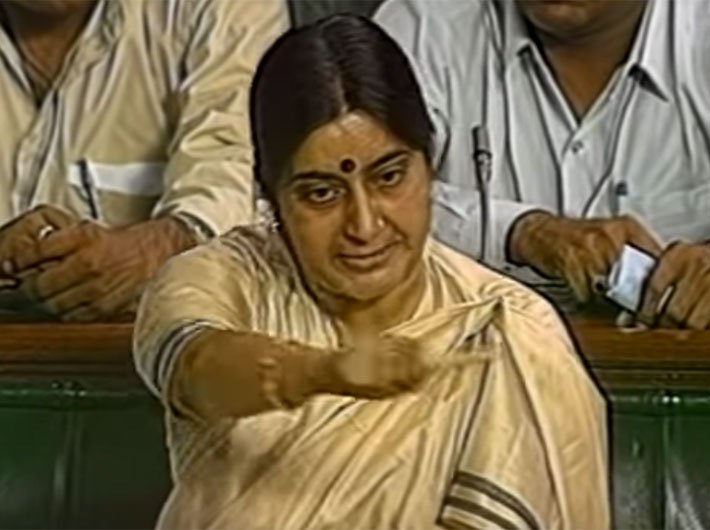Always a people’s politician, she crafted a unique role for herself with acumen and nuance
During her long and enviable career in politics, Sushma Swaraj fashioned a one-of-a-kind place for herself: a spirited debater who could articulate the common man’s aspirations in the common man’s language – with grace, nuance and the auntie-next-door persona.
Swaraj died of a heart attack in New Delhi Tuesday evening, soon after her last tweet, congratulating the prime minister on the passage in parliament of the Jammu and Kashmir reorganization bill. “I was waiting to see this day in my lifetime,” she said. Her last words seem poignant now.
Prime Minister Narendra Modi tweeted, “Sushma Ji’s demise is a personal loss. She will be remembered fondly for everything that she’s done for India. My thoughts are with her family, supporters and admirers in this very unfortunate hour. Om Shanti.”
Her career began as an activist with the Akhil Bharatiya Vidyarthi Parishad (ABVP) in Haryana, and soon she graduated to the Jan Sangh, the precursor to the Bharatiya Janata party (BJP). With her unusual oratory and debating skills, she won the assembly elections in 1977 and became a minister in Haryana when she was only 25 – arguably the youngest minister in India.
Swaraj became a Rajya Sabha member in 1990, but switched to the Lok Sabha in 1996, winning from South Delhi. This was when the BJP finally formed the government at the centre for the first time, and she served as minister of information and broadcasting. Though the Atal Bihari Vajpayee government lost the vote of confidence in 13 days later, Swaraj’s intervention in the debate over it would be long remembered.
In a fiery speech on June 11, 1996, she etched out her article of faith with more efficiency than most leaders of the right ever managed:
“We are called communal because we advocate the singing of Vande Mataram. Yes, we are communal. Because we fight for the respect of the national flag. Yes, we are communal because we demand the abolition of Article 370. Yes, we are communal because we advocate the idea of cow protection in India. Our definition of secularism is that a Hindu should be a good Hindu, a Muslim should be a good Muslim, a Sikh should be a good Sikh, a Christian should be a good Christian, and everyone should follow their religions while simultaneously respecting each other.”
Always in service of the party, she took up the unenviable task, when the BJP fielded her as Delhi chief minister shortly before the December 1998 elections it was bound to lose. It did, but she won hearts. Her next stop was Bellary in Karnataka, where she challenged Congress president Sonia Gandhi in the September 1999 Lok Sabha elections, making an issue of her foreign origins. Not only did she learn rudimentary Kannada to make a better rapport with people, but continued to learn the language long after losing the polls.
With the BJP returning to power at the centre, she again served as a union minister, holding charge of the information and broadcasting ministry as well as the health ministry. When the Congress-led UPA won in 2004, and retained power in 2009, and LK Advani resigned from the post of the leader of opposition in the Lok Sabha, it was Swaraj who rose to the position.
With Narendra Modi leading the BJP to power in 2014, many old-guard leaders were swept aside but Swaraj rose to become the external affairs minister. As a strong prime minister steered the foreign policy, Swaraj gracefully found a new role for herself, in looking after the nitty-gritties of the ministry while keeping a low profile. The rapport she created with people through Twitter, in India and abroad, especially in times of disasters and evacuation, and her readiness to reach out the needy with help earned her praise from all quarters. Gracefully, again, she refused to contest the 2019 Lok Sabha elections, citing health reasons.
As Advani summed up in his tribute to her, “Sushmaji was a fine human being. She touched everyone with her warmth and compassionate nature.”
